AWM41 1072 - [Official History, 1914-18 War: Records of Arthur G Butler:] Interviews containing accounts of Nursing experiences in the AANS [Australian Army Nursing Service]. These nurses were interviewed by Matron Kellett - Part 1
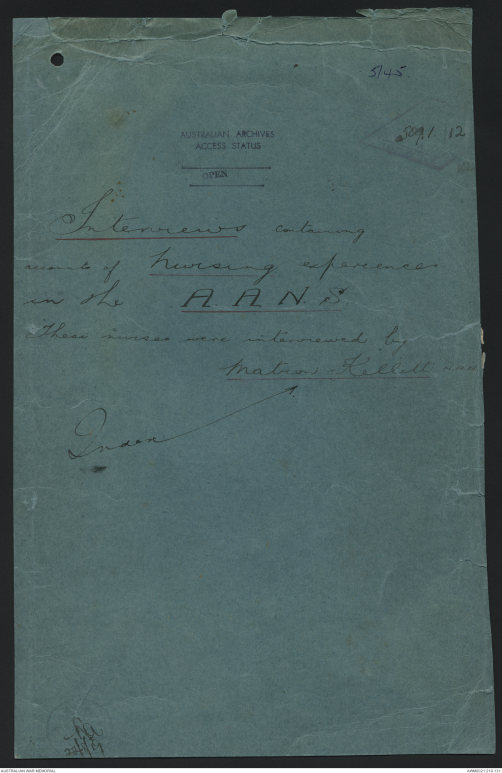
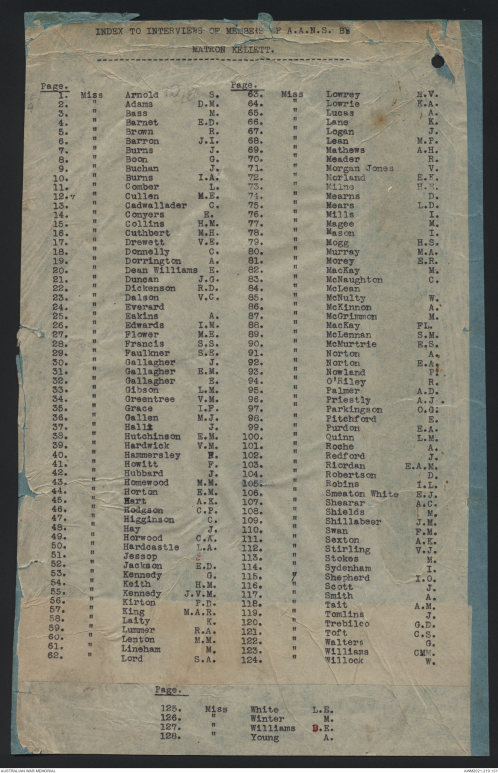
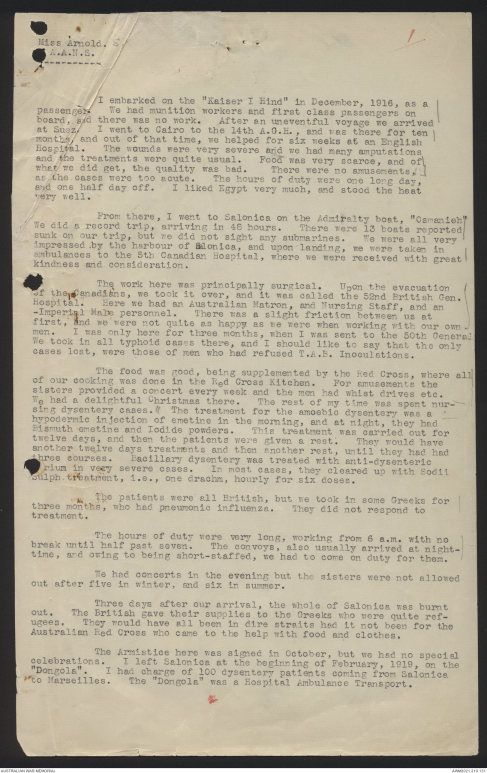
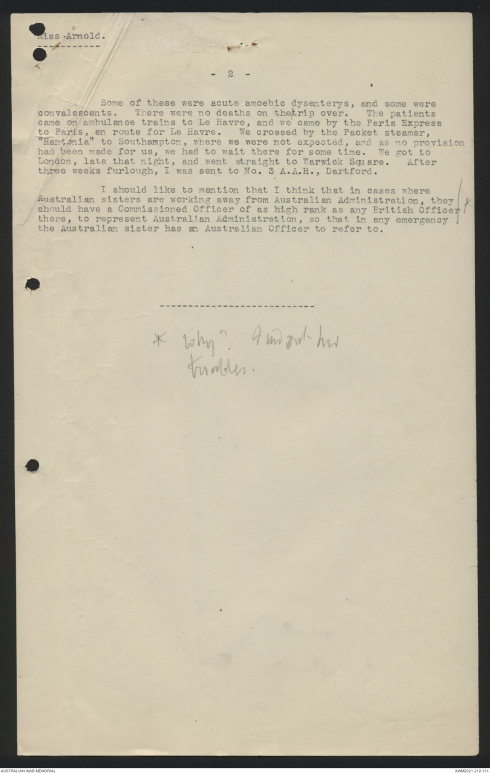
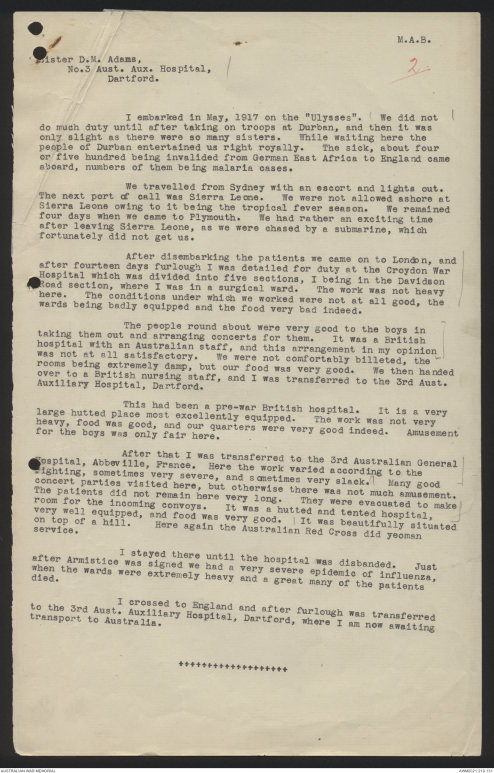
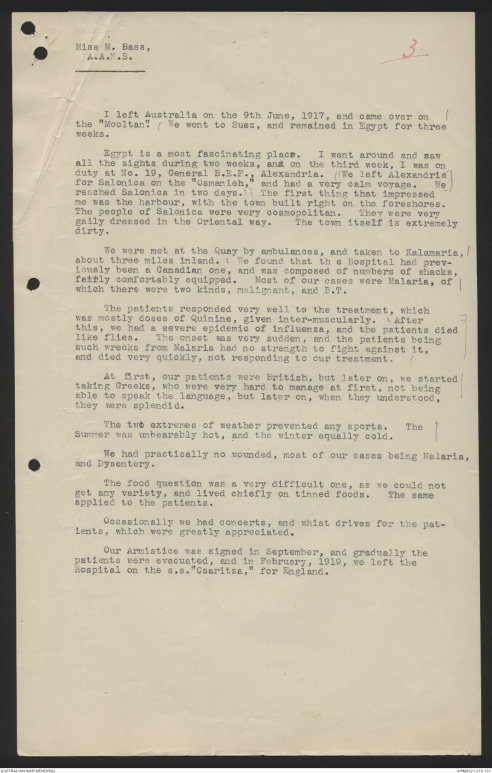
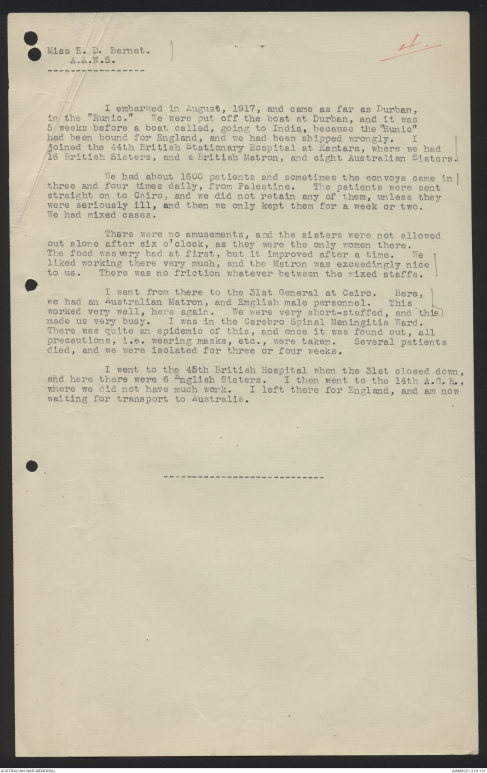
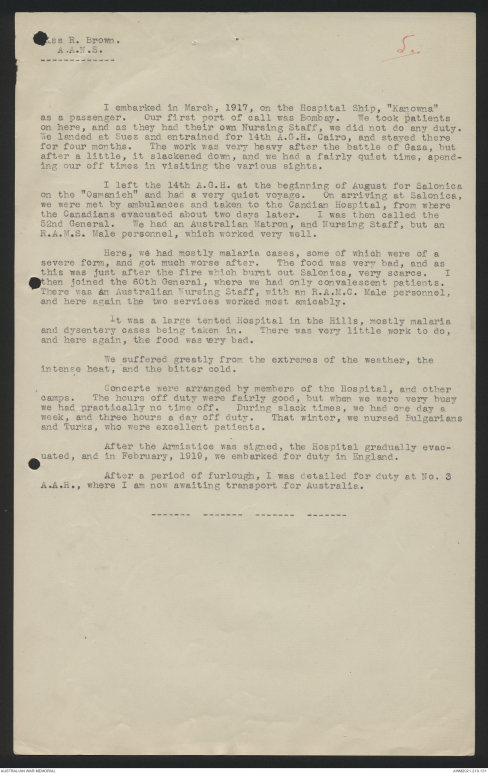
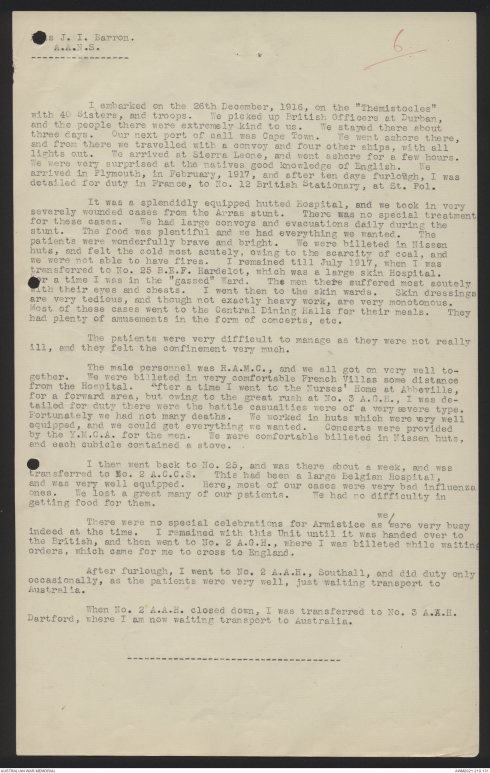
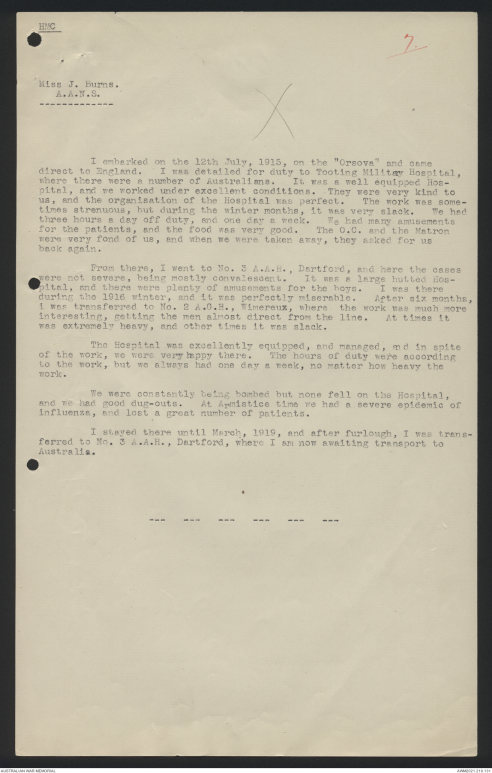
5/45
AUSTRALIAN ARCHIVES 509.1/12
ACCESS STATUS
OPEN
Interviews containing
accounts of nursing experiences
in the A.A.N.S.
These nurses were interviewed by
Matron Kellett A.A.N
Index ↑
INDEX TO INTERVIEWS OF MEMBERS OF A.A.N.S. BY
MATRON KELLETT.
| Page. | Page. | ||||||
| 1. | Miss | Arnold | S. | 63. | Miss | Lowrey | N.V. |
| 2. | " | Adams | D.M. | 64. | " | Lowrie | K.A. |
| 3. | " | Bass | M. | 65. | " | Lucas | A. |
| 4. | " | Barnet | E.D. | 66. | " | Lane | K. |
| 5. | " | Brown | R. | 67. | " | Logan | J. |
| 6. | " | Barron | J.I. | 68. | " | Lean | M.P. |
| 7. | " | Burns | J. | 69. | " | Mathews | A.H. |
| 8. | " | Boon | G. | 70. | " | Meader | R. |
| 9. | " | Buchan | J. | 71. | " | Morgan Jones | V. |
| 10. | " | Burns | I.A. | 72. | " | Norland | E.K. |
| 11. | " | Comber | L. | 73. | " | Milne | H.E. |
| 12. | " | Cullen | M.E. | 74. | " | Mearns | D. |
| 13. | " | Cadwallader | C. | 75. | " | Mears | L.D. |
| 14. | " | Conyers | E. | 76. | " | Mills | I. |
| 15. | " | Collins | H.M. | 77. | " | Magee | M. |
| 16. | " | Cuthbert | M.H. | 78. | " | Mason | I. |
| 17. | " | Drewett | V.E. | 79. | " | Mogg | H.S. |
| 18. | " | Donnelly | C. | 80. | " | Murray | M.A. |
| 19. | " | Dorrington | A. | 81. | " | Morey | E.R. |
| 20 | " | Dean Williams | K. | 82. | " | MacKay | M. |
| 21. | " | Duncan | J.G. | 83. | " | McNaughton | C. |
| 22. | " | Dickenson | R.D. | 84. | " | McLean | |
| 23. | " | Dalson | V.C. | 85. | " | McNulty | W. |
| 24. | " | Everard | 86. | " | McKinnon | A. | |
| 25. | " | Eakins | A. | 87. | " | McGrimmon | M. |
| 26. | " | Edwards | I.N. | 88. | " | MacKay | FL. |
| 27. | " | Flower | M.E. | 89. | " | McLennan | S.M. |
| 28. | " | Francis | S.S. | 90. | " | McMurtrie | E.S. |
| 29. | " | Faulkner | S.E. | 91. | " | Norton | A. |
| 30. | " | Gallagher | J. | 92. | " | Norton | E.A. |
| 31. | " | Gallagher | E.M. | 93. | " | Nowland | P. |
| 32. | " | Gallagher | E. | 94. | " | O'Riley | R. |
| 33. | " | Gibson | L.M. | 95. | " | Palmer | A.D. |
| 34. | " | Greentree | V.M. | 96. | " | Priestly | A.J. |
| 35. | " | Grace | I.F. | 97. | " | Parkingson | O.G. |
| 36. | " | Gallen | M.J. | 98. | " | Pitchford | E. |
| 37. | " | Hall |
J. | 99. | " | Purdon | E.A. |
| 38. | " | Hutchinson | E.M. | 100. | " | Quinn | L.M. |
| 39. | " | Hardwick | V.M. | 101. | " | Roche | A. |
| 40. | " | Hammersley | F. | 102. | " | Redford | J. |
| 41. | " | Howitt | F. | 103. | " | Riordan | E.A.M. |
| 42. | " | Hubbard | J. | 104. | " | Robertson | D. |
| 43. | " | Homewood | M.M. | 105. | " | Robins | I.L. |
| 44. | " | Horton | E.M. | 106. | " | Smeaton White | E.J. |
| 45. | " | Hart | A.K. | 107. | " | Shearer | A.C. |
| 46. | " | Hodgson | C.P. | 108. | " | Shields | M. |
| 47. | " | Higginson | C. | 109. | " | Shillabeer | J.M. |
| 48. | " | Hay | J. | 110. | " | Swan | F.M. |
| 49. | " | Horwood | C.A. | 111. | " | Sexton | A.K. |
| 50. | " | Hardcastle | L.A. | 112. | " | Stirling | V.J. |
| 51. | " | Jessop | [[E?]] | 113. | " | Stokes | M. |
| 52. | " | Jackson | E.D. | 114. | " | Sydenham | I. |
| 53. | " | Kennedy | G. | 115. | " | Shepherd | I.O. |
| 54. | " | Keith | H.M. | 116. | " | Scott | J. |
| 55. | " | Kennedy | J.V.M. | 117. | " | Smith | A. |
| 56. | " | Kirton | P.D. | 118. | " | Tait | A.M. |
| 57. | " | King | M.A.R. | 119. | " | Tomlins | J. |
| 58. | " | Laity | K. | 120. | " | Trebilco | G.D. |
| 59. | " | Lummer | R.A. | 121. | " | Toft | C.S. |
| 60. | " | Lenton | M.M. | 122. | " | Walters | G. |
| 61. | " | Lineham | M. | 123. | " | Williams | CMM. |
| 62. | " | Lord | S.A. | 124. | " | Willock | W. |
| Page. | |||
| 125. | Miss | White | L.E. |
| 126. | " | Winter | M. |
| 127. | " | Williams | D.E. |
| 128. | " | Young | A. |
1
Miss Arnold.
A.A.N.S.
I embarked on the “Kaiser 1 Hind" in December, 1916, as a
passenger. We had munition workers and first class passengers on
board, and there was no work. After an uneventful voyage we arrived
at Suez. I went to Cairo to the 14th A.G.H., and was there for ten
months, and out of that time, we helped for six weeks at an English
Hospital. The wounds were very severe and we had many amputations
and the treatments were quite usual. Food was very scarce, and of
what we did get, the quality was bad. There were no amusements,
as the cases were too acute. The hours of duty were one long day,
and one half day off. I liked Egypt very much, and stood the heat
very well.
From there. I went to Salonica on the Admiralty boat, “Camanieh”
We did a record trip arriving in 48 hours. There were 13 boats reported
sunk on our trip, and we did not sight any submarines. We were all very
impressed by the harbour of Salonica, and upon landing, we were taken in
ambulances to the 5th Canadian Hospital, where we were received with great
kindness and consideration.
The work here was principally surgical. Upon the evacuation
of the Canadians, we took it over, and it was called the 52nd British Gen.
Hospital. Here we had an Australian Matron, and Nursing Staff and an
-Imperial Male personnel. There was a slight friction between us at
first, and we were not quite as happy as we were when working with our own
men. I was only here for three months, when I was sent to the 50th General
We took in all typhoid cases there, and I should like to say that the only
cases lost, were those of men who refused T.A.B. Inoculations.
The food was good, being supplemented by the Red Cross, where all
of our cooking was done in the Red Cross Kitchen. For amusements the
sisters provided a concert every week and the men had whist drives etc.
We had a delightful Christmas there. The rest of my time was spent nursing
dysentery cases. The treatment for the amoebic dysentery was a
hypodermic injection of emetine in the morning, and at night, they had
Bismuth emetine and Iodide powders. This treatment was carried out for
twelve days, and then the patients were given a rest. They would have
another twelve days treatments and then another rest, until they had
three courses. Bacillary dysentery was treated with
anti-dysenteric
[[?]]rium in very severe cases. In most cases, they cleared up with Sodii
Sulph. Treatment, i.e. one drachm, hourly for six doses.
The patients were all British, but we took in some Greeks for
three months, who had pneumonic influenza. They did not respond to
treatment.
The hours of duty were very long, working from 6 a.m. with no
break until half past seven. The convoys, also usually arrived at nighttime,
and owing to being short-staffed, we had to come on duty for them.
We had concerts in the evening but the sisters were not allowed
out after five in winter and six in summer.
Three days after our arrival, and the whole of Salonica was burnt
out. The British gave their supplies to the Greeks who were quite refugees.
They would have all been in dire straits had it not been for the
Australian Red Cross who came to the help with food and clothes.
The Armistice here was signed in October, but we had no special
celebrations. I left Salonica at the beginning of February, 1919, on the
“Dongola”. I had charge of 100 dysentery patients coming from Salonica
to Marseilles. The “Dongola” was a Hospital Ambulance Transport.
Miss Arnold.
2
Some of these were acute amoebic dysenterys, and some were
convalescents. There were no deaths on the trip over. The patients
came on ambulance trains to Le Havre, and we came by the Paris Express
to Paris, en route for Le Havre. We crossed by Packet steamer,
“Hantonia” to Southhampton, where we were not expected, and as no provision
had been made for us, we had to wait there for some time. We got to
London, late that night, and went straight to Warwick Square. After
three weeks furlough, I was sent to No. 3 A.A.H., Dartford.
I should like to mention that I think in cases where
Australian sisters are working away from Australian Administration, they
should have a Commissioned Officer of as high rank as any British Officer
there, to represent Australian Administration, so that in any emergency
the Australian sister has an Australian Officer to refer to.
* Why? I had not her
troubles.
M.A.B.
[*2*]
Sister D.M. Adams.
No.3 Aust. Aux. Hospital,
Dartford.
I embarked in May, 1917 on the “Ulysses”. We did not
do much duty until after taking on troops at Durban, and then it was
only slight as there were so many sisters. While waiting here the
people of Durban entertained us right royally. The sick, about four
or five hundred being invalid from German East Africa to England came
aboard, numbers of them being malaria cases.
We travelled from Sydney with an escort and lights out.
The next port of call was Sierra Leone. We were not allowed ashore at
Sierra Leone owing to it being the tropical fever season. We remained
four days when we came to Plymouth. We had rather an exciting time
after leaving Sierra Leone, as we were chased by a submarine, which
fortunately did not get us.
After disembarking the patients we came on to London, and
after fourteen days furlough I was detailed for duty at the Croydon War
Hospital which was divided into five sections, I being in the Davidson
Road section, where I was in a surgical ward. The work was not heavy
here. The conditions under which we worked were not at all good, the
wards being badly equipped and the food very bad indeed.
The people around about were very good to the boys in
taking them out and arranging concerts for them. It was a British
hospital with an Australian staff, and this arrangement in my opinion
was not at all satisfactory. We were not comfortably billeted, the
rooms being extremely damp, but our food was very good. We then handed
over to a British nursing staff, and I was transferred to the 3rd Aust.
Auxiliary Hospital, Dartford.
This has been a pre-war British hospital. It is a very
large hutted place most excellently equipped. The work was not very
heavy, food was good, and our quarters were very good indeed. Amusement
for the boys was only fair here.
After that I was transferred to the 3rd Australian General
Hospital, Abbeville, France. Here the work varied according to the
fighting, sometimes very severe, and sometimes very slack. Many good
concert parties visited here, but otherwise there was not much amusement.
The patients did not remain here very long. They were evacuated to make
room for the incoming convoys. It was a hutted and tented hospital,
very well equipped, and food was very good. It was beautifully situated
on top of a hill. Here again the Australian Red Cross did yeoman
service.
I stayed here until the hospital was disbanded. Just
after Armistice was signed we had a very severe epidemic of influenza,
when the wards were extremely heavy and a great many of the patients
died.
I crossed to England and after furlough was transferred
to the 3rd Aust. Auxiliary Hospital, Dartford, where I am now awaiting
transport to Australia.
Miss M. Bass.
A.A.N.S.
[*3 *]
I left Australia on the 9th June, 1917, and came over on a
the “Mooltan”. We went to Suez and Egypt for three weeks.
Egypt is the most fascinating place. I went around and saw
all the sites during two weeks, and on the third week, I was on
duty at No. 19, General B.E.F., Alexandria. We left Alexandria
for Salonica on the “Osmanieh,” and had a very calm voyage. We
reached Salonica in two days. The first thing that impressed
me was the harbour, with the town built right on the foreshores.
The people of Salonica were very cosmopolitan. They were very
gaily dressed in the Oriental way. The town itself is extremely
dirty.
We were met at the Quay by ambulances, and taken to Kalamaria,
about three miles inland. We found that the Hospital had previously
being a Canadian one, and was composed of numbers of shacks,
fairly comfortably equipped. Most of our cases were Malaria, of
which there were two kinds, malignant and B.T.
The patients responded very well to the treatment, which
was mostly doses of Quinine, given inter-muscularly. After
this, we had a severe epidemic of influenza, and the patients died
like flies. The onset was very sudden, and the patients being
such wrecks from Malaria had no strength to fight against it,
and died very quickly, not responding to our treatment.
At first, our patients were British, but later on, we started taking Greeks, who were very hard to manage at first, not being
able to speak the language, but later on, when they understood,
they were splendid.
The two extremes of weather prevented any sports. The
Summer was unbearably hot, and the winter equally cold.
We had practically no wounded, most of our cases being Malaria,
and Dysentery.
The food question was a very difficult one, as we could not
get any variety, and lived chiefly on tinned foods. The same
applied to the patients.
Occasionally we had concerts, and whist drives for the patients
which were greatly appreciated.
Our Armistice was signed in September, and gradually the
patients were evacuated, and in February, 1919, we left the
Hospital on the s.s.”Czaritza,” for England.
[*4*]
Miss E. D. Barnet.
A.A.N.S.
I embarked in August 9, 1917, and came as far as Durban,
in the “Runic.” We were put off the boat at Durban, and it was
5 weeks before a boat called, going to India, because the “Runic”
had been bound for England, and we had been shipped wrongly. I
joined the 44th British Stationary Hospital at Kantara, where we had
16 British Sisters, and a British Matron, and eight Australian Sisters.
We had about 1600 patients and sometimes the convoys came in
three or four times daily, from Palestine. The patients were sent
straight on to Cairo, and we did not retain any of them, unless they
were seriously ill, and then we only kept them for a week or two.
We had mixed cases.
There were no amusements, and the sisters were not allowed
out alone after six o’clock, as they were the only women there.
The food was very bad at first, but it improved after a time. We
liked working there very much, and the Matron was exceedingly nice
to us. There was no friction whatever between the mixed staffs.
I went from there to the 31st General at Cairo. Here,
we had an Australian Matron, and English male personnel. This
worked very well, here again. We were very short-staffed, and this
made us very busy. I was in the Cerebro Spinal Meningitis Ward.
There was quite an epidemic of this, and once it was found out, all
precautions, i.e. wearing masks, etc., were taken. Several patients.
died, and we were isolated for three or four weeks.
I went to the 45th British Hospital when the 31st closed down,
and here there were 6 English Sisters. I then went to the 14th A.G.H.,
where we did not have much work. I left there for England, and am now
waiting for transport to Australia.
[*5*]
Miss R. Brown.
A.A.N.S.
I embarked in March, 1917, on the Hospital Ship, “Kanowna”
as a passenger. Our first port of call was Bombay. We took patients
on here, and as they had their own Nursing Staff, we did not do any duty.
We landed at Suez and entrained for the 14th A.G.H. Cairo, and stayed there
for four months. The work was very heavy after the battle of Gaza, but
after a little, it slackened down, and we had a fairly quiet time, spending
our off times in visiting the various sights.
I left the 14th A.G.H. at the beginning of August for Salonica
on the “Oamanieh” and had a very quiet voyage. After arriving at Salonica,
we were met by ambulances and taken to the Candian Hospital, from where
the Canadians evacuated about two days later. I was then called the
52nd General. We had an Australian Matron, and Nursing Staff, but an
R.A.M.S. Male personnel, which worked very well.
Here, we had mostly malaria cases, some of which were of a
severe form, and got much worse after. The food was very bad, and as
this was just after the fire which burnt out Salonica, very scarce. I
then joined the 60th General, where we had only convalescent patients.
There was an Australian Nursing Staff, with an R.A.M.C. Male personnel,
and here again the two services worked most amicably.
It was a large tented Hospital in the Hills, mostly malaria
and dysentery cases being taken in. There was very little work to do,
and here again, the food was very bad.
We suffered greatly from the extremes of the weather, the
intense heat, and the bitter cold.
Concerts were arranged by members of the Hospital, and other
camps. The hours of duty were fairly good, but when we were very busy
we had practically no time off. During slack times, we had one day a
week, and three hours a day off duty. That winter, we nursed Bulgarians,
and Turks, who were excellent patients.
After the Armistice was signed, the Hospital gradually evacuated,
and in February, 1919, we embarked for duty in England.
After a period of furlough, I was detailed for duty at No. 3
A.A.H., where I am now awaiting transport for Australia.
[*6*]
[[Mis]]s J. I. Barron.
A.A.N.S.
I embarked on 26 December, 1916, on the “Thermistocles”
with 40 sisters, and troops. We picked up British officers at Durban,
and the people there were extremely kind to us. We stayed there about
three days. Our next port of call was Cape Town. We went ashore there,
and from there we travelled with a convoy and four other ships, with all
lights out. We arrived at Sierra Leone, and went ashore for a few hours.
We were very surprised at the natives good knowledge of English. We
arrived in Plymouth, in February 1917, and after ten days furlough, I was
detailed for duty in France, to No. 12 British Stationary, at St. Pol.
It was a splendidly equipped hutted Hospital, and we took in very
severely wounded cases from the Arras stunt. There was no special treatment
for these cases. We had large convoys and evacuations daily during the
stunt. The food was plentiful and we had everything we wanted. The
patients were wonderfully brave and bright. We were billeted in Nissen
huts, and felt the cold most acutely, owing to the scarcity of coal, and
we were not able to have fires. I remained until July 1917, when I was
transferred to No. 25 B.E.F. Hardelot, which was a large skin Hospital.
For a time I was in the “gassed” Ward. The men there suffered most acutely
with their eyes and chests. I went to the skin wards. Skin dressings
are very tedious, and though not exactly heavy work, are very monotonous.
Most of these cases went to the Central Dining Halls for their meals. They
had plenty of amusements in the form of concerts, etc.
The patients were very difficult to manage as they were not really
ill, and they felt the confinement very much.
The male personnel was R.A.M.C., and we all got on very well together.
We were billeted in very comfortable French villas some distance
from the Hospital. After a time I went to the Nurses’ Home at Abbeville,
for a forward area, but owing to the great rush at No. 3 A.G.H., I was detailed
for duty there were the battle casualties were of a very severe type.
Fortunately we had not many deaths. We worked in huts which were very well
equipped, and we could get everything we wanted. Concerts were provided
by the Y.M.C.A. for the men. We were comfortable billeted in Nissen huts,
and each cubicle contained a stove.
I then went back to No. 25, and was there about a week, and was
transferred to No. 2 A.C.C.S. This has been a large Belgian Hospital,
and was very well equipped. Here, most of our cases were very bad influenza
ones. We lost a great many of our patients. We had no difficulty in
getting food for them.
There were no special celebrations for Armistice as ^we were very busy
indeed at the time. I remained with this Unit until it was handed over to
the British, and then went to No. 2 A.G.H., where I was billeted while waiting
orders, which came for me to cross to England.
After furlough, I went to No. 2 A.A.H., Southall, and did duty only
occasionally, as the patients were very well, just waiting transport to
Australia.
When No. 2 A.A.H. closed down, I was transferred to No. 3 A.A.H.
Dartford, where I am now waiting transport to Australia.
HMC
[*7*]
Miss J. Burns.
A.A.N.S.
I embarked on 12th July, 1915, on the “Orsova” and came
direct to England. I was detailed for duty to Tooting Military Hospital,
where there were a number of Australians. It was a well equipped Hospital,
and we worked under excellent conditions. They were very kind to
us, and the organisation of the Hospital was perfect. The work was sometimes
strenuous, but during the winter months, it was very slack. We had
three hours a day off duty and one day a week. We had many amusements
for the patients, and the food was very good. The O.C. and the Matron
were very fond of us, and when we were taken away, they asked for us
back again.
From there, I went to the No. 3 A.A.H., Dartford, and here the cases
were not severe, being mostly convalescent. It was a large hutted Hospital,
and there were plenty of amusements for the boys. I was there
during the 1916 winter, and it was perfectly miserable. After six months,
I was transferred to the No. 2 A.G.H., Wimereux, where the work was much more
interesting, getting the men almost direct from the line. At times it
was extremely heavy, and other times it was slack.
The Hospital was excellently equipped, and managed, and in spite
of the work, we were very happy there. The hours of duty were according
to the work, but we always had one day a week, no matter how heavy the
work.
We were constantly being bombed but none fell on the Hospital,
and we had good dug-outs. At Armistice time we had a severe epidemic of
influenza, and lost a great number of patients.
I stayed there until March, 1919, and after furlough, I was transferred
to No. 3 A.A.H., Dartford, where I am now awaiting transport to
Australia.
 Sam scott
Sam scottThis transcription item is now locked to you for editing. To release the lock either Save your changes or Cancel.
This lock will be automatically released after 60 minutes of inactivity.